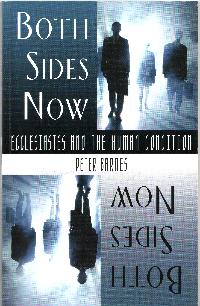
Les shared the following:
Here's a religious book called "Both Sides Now: Ecclesiastes and the Human Condition" The only Joni content is in the first and last paragraphs of the book.
Chapter 1:
Eternity and Madness in Our Hearts
David Crosby once quipped that "Anybody who says he clearly remembers the 1960s obviously wasn't there." For all its apparently unrestrained hedonism -with sex and dope as substitutes for love and hope -the decade of the 1960s did produce some works of thoughtful reflection. One such example is Joni Mitchell's song Both Sides Now, which contains the lines:
I've looked at life from both sides now,
From win and lose and still somehow,
It's life's illusions I recall;
I really don't know life at all.
The song evokes something of the same mood and ethos as the book of Ecclesiastes, found in the Old Testament of the Christian Scriptures. Life is investigated from both sides, yet still remains strangely elusive and unsatisfying.
Last paragraph:
Joni Mitchell looked at life from both sides, and sang that she really didn't know life at all. There was nothing to integrate life, to pull it all together, and to make sense of its many enigmas. By grace, we can go further than that. We cannot know everything, but we can know life in Christ. Nobody understood our perilous, yet still hopeful, condition better than Blaise Pascal. He saw that 'it is equally dangerous for man to know God without knowing his own wretchedness as to know his own wretchedness without knowing the Redeemer who can cure him ... Jesus Christ is the object of all things, the center towards which all things tend. Whoever knows him knows the reason for everything ... but it is not possible to know Christ without knowing both God and our wretchedness alike.'
Thank you, Les!
(Contributed by Les Irvin)
Comments:
Log in to make a comment